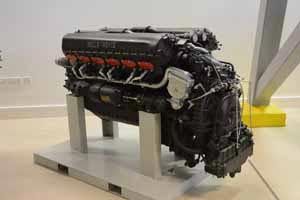

The Imperial War Museum Duxford is a branch of the Imperial War Museum located near Duxford in Cambridgeshire, England. Britain's largest aviation museum, Duxford houses the museum's large exhibits, including nearly 200 aircraft, military vehicles, artillery and minor naval vessels in seven main exhibition buildings. The site also provides storage space for the museum's other collections of material such as film, photographs, documents, books and artifacts. The site accommodates several British Army regimental museums, including those of the Parachute Regiment (named Airborne Assault) and the Royal Anglian Regiment.
Based on the historic Duxford Aerodrome, the site was originally operated by the Royal Air Force (RAF) during the First World War. During the Second World War Duxford played a prominent role during the Battle of Britain and was later used by United States Army Air Forces fighter units in support of the daylight bombing of Germany. Duxford remained an active RAF airfield until 1961. After the Ministry of Defence declared the site surplus to requirements in 1969 the Imperial War Museum received permission to use part of the site for storage. The entirety of the site was transferred to the museum in February 1976.
In keeping with the site's history many of Duxford's original buildings, such as hangars used during the Battle of Britain, are still in use. Many of these buildings are of particular architectural or historic significance and over thirty have listed building status, Duxford "retain[ing] the best-preserved technical fabric remaining from [a historic airfield] up to November 1918" and being "remarkably well-preserved". The site also features several purpose-built exhibition buildings, such as the Stirling Prize-winning American Air Museum, designed by Sir Norman Foster. The site remains an active airfield and is used by civilian flying companies, and hosts regular air shows. The site is operated in partnership with Cambridgeshire County Council and the Duxford Aviation Society, a charity formed in 1975 to preserve civil aircraft and promote appreciation of British civil aviation history.
Folder
a bob mortlock website




